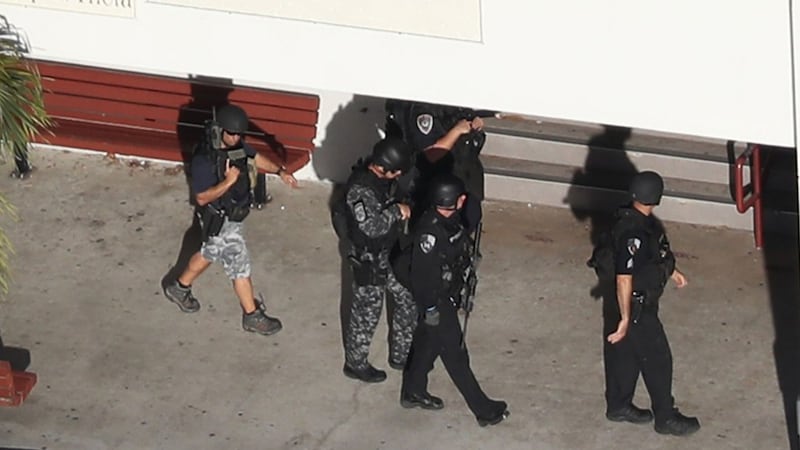Wednesday will mark one month since a gunman stormed into a South Florida high school and killed 17 people with an AR-15.
On school campuses across the United States Wednesday, students, teachers and parents will be taking part in a walkout to focus attention on the fight to end gun violence in schools.
“ENOUGH National School Walkout” was organized by students working with the Women’s March Youth Empower to call for action on gun control and to remember the 17 people who authorities say were killed by Nickolas Cruz at Marjory Stoneman High School in Parkland, Fla., on Valentine’s Day.
According to organizers, the goal of the walkout is "to demand Congress pass legislation to keep us safe from gun violence at our schools, on our streets and in our homes and places of worship."
Since the shooting, many schools across the nation have staged walkouts calling on lawmakers to tighten gun laws.
The shooting also brought attention to an argument that teachers should be armed.
Here’s a recap of events since the shooting last month:
Students Act
Marjory Stoneman High School students immediately took action after the shooting.
Many created social media campaigns, held rallies, lobbied lawmakers and some went straight to Tallahassee to demand action from lawmakers.
Many spoke at a CNN town hall event with the Broward County sheriff, a National Rifle Association spokesperson and Sen. Bill Nelson and Marco Rubio.
One student asked Rubio to turn down money from the NRA.
Governor Responds
Florida Gov. Rick Scott made a swift response to the shooting.
He met with members of law enforcement, school administrators, teachers, mental health experts and leaders of various state agencies to discuss school safety and changes to gun laws.
Lawmakers Act
The meetings eventually led to the Marjory Stoneman Douglas High School Public Safety Act.
It was passed in the Florida House and Senate and was signed by Scott before the end of the legislative session.
He signed it while surrounded by the families of the victims.
The bill raises the minimum age to buy rifles from 18 to 21, extends a three-day waiting period for handgun purchases to include long guns and bans bump stocks, which allow guns to mimic fully automatic fire. It also creates a so-called guardian program enabling some teachers and other school employees to carry guns.
The bill fell short of achieving the ban on assault-style weapons sought by survivors.
The legislation includes increased funding for gun and school safety and for mental health resources. It also establishes the marshal program, which would allow school personnel to receive law enforcement training and carry a concealed weapon on campus.
It also gives school districts the option to have trained, armed teaches on campus, which the governor was uneasy about.
School Threats
Since the shooting, schools across the state have seen an increase in hoax threats.
Eighteen students have been arrested in Volusia County for threat-related incidents.
Interactive map: Central Florida school threats, hoaxes
Some law enforcement agencies are cracking down and creating stricter punishments for students who make threats.
Alleged Shooter
Cruz is facing 17 counts of premeditated murder.
Cruz, according to a timeline put together by police, set off alarms as he entered Marjory Stoneman Douglas High, the school he had been expelled from, hoping to get more people into the hallways and into his line of fire.
After firing into classrooms and at students in the hallways, Cruz dropped the weapon he had with him, an AR-15 weapon purchased legally one year ago, and blended in with the crowd of students fleeing the building, according to a timeline drawn out by investigators.
From the school, he headed to a Subway and bought himself a soft drink, went to a McDonald's to sit for a few minutes, left the restaurant and was arrested a short time later without incident, deputies said.
He remains in the Broward County Jail.
%INLINE %%INLINE %
Cox Media Group






